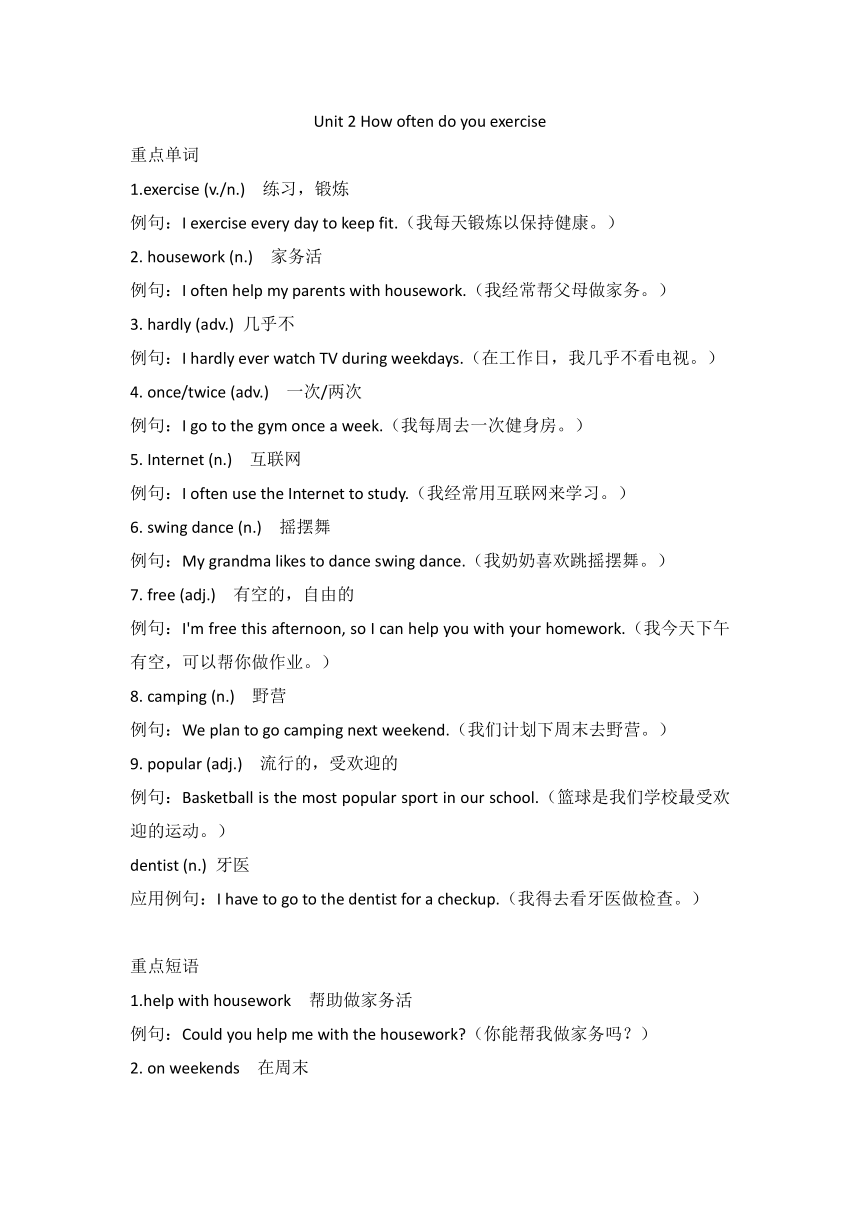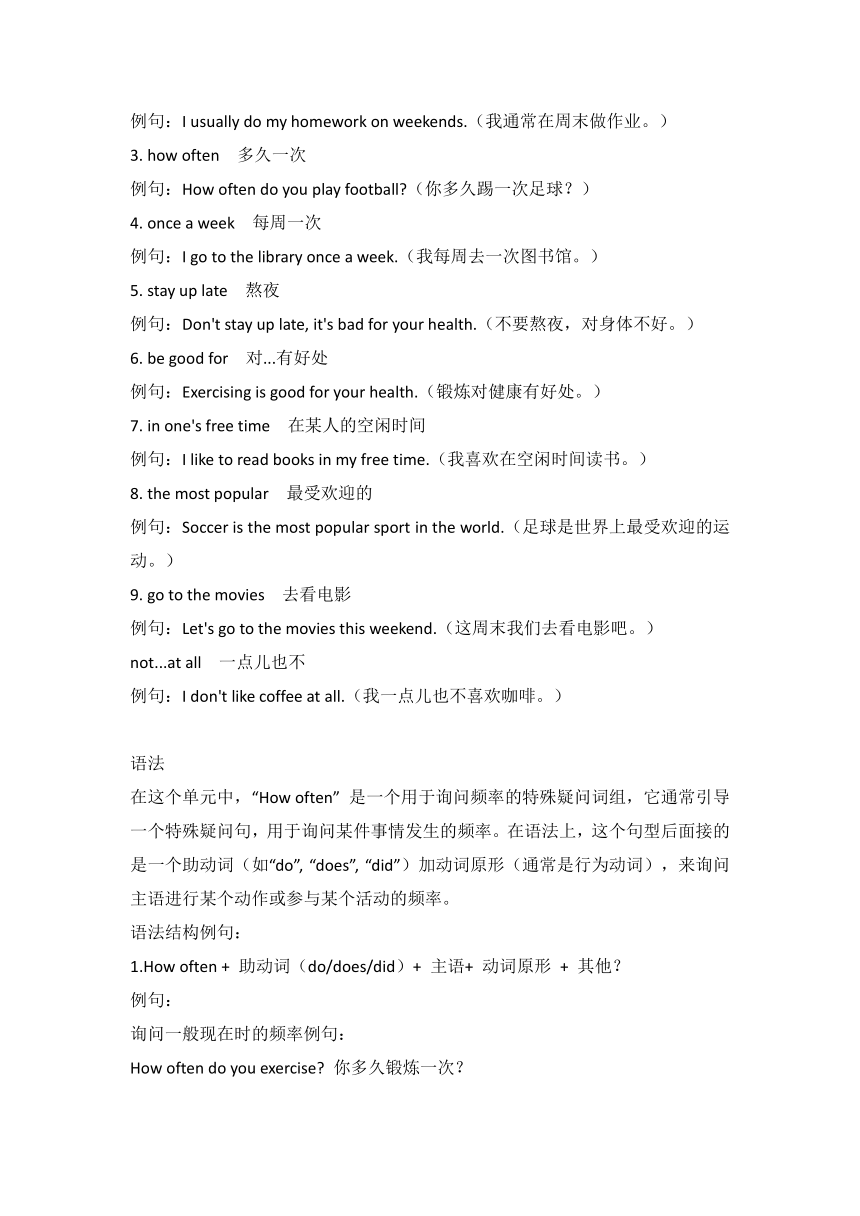Unit 2 How often do you exercise 知识点解析 2024-2025学年人教版八年级英语上册
文档属性
| 名称 | Unit 2 How often do you exercise 知识点解析 2024-2025学年人教版八年级英语上册 |  | |
| 格式 | docx | ||
| 文件大小 | 19.3KB | ||
| 资源类型 | 教案 | ||
| 版本资源 | 人教新目标(Go for it)版 | ||
| 科目 | 英语 | ||
| 更新时间 | 2024-08-08 13:44:15 | ||
图片预览


文档简介
Unit 2 How often do you exercise
重点单词
1.exercise (v./n.) 练习,锻炼
例句:I exercise every day to keep fit.(我每天锻炼以保持健康。)
2. housework (n.) 家务活
例句:I often help my parents with housework.(我经常帮父母做家务。)
3. hardly (adv.) 几乎不
例句:I hardly ever watch TV during weekdays.(在工作日,我几乎不看电视。)
4. once/twice (adv.) 一次/两次
例句:I go to the gym once a week.(我每周去一次健身房。)
5. Internet (n.) 互联网
例句:I often use the Internet to study.(我经常用互联网来学习。)
6. swing dance (n.) 摇摆舞
例句:My grandma likes to dance swing dance.(我奶奶喜欢跳摇摆舞。)
7. free (adj.) 有空的,自由的
例句:I'm free this afternoon, so I can help you with your homework.(我今天下午有空,可以帮你做作业。)
8. camping (n.) 野营
例句:We plan to go camping next weekend.(我们计划下周末去野营。)
9. popular (adj.) 流行的,受欢迎的
例句:Basketball is the most popular sport in our school.(篮球是我们学校最受欢迎的运动。)
dentist (n.) 牙医
应用例句:I have to go to the dentist for a checkup.(我得去看牙医做检查。)
重点短语
1.help with housework 帮助做家务活
例句:Could you help me with the housework (你能帮我做家务吗?)
2. on weekends 在周末
例句:I usually do my homework on weekends.(我通常在周末做作业。)
3. how often 多久一次
例句:How often do you play football (你多久踢一次足球?)
4. once a week 每周一次
例句:I go to the library once a week.(我每周去一次图书馆。)
5. stay up late 熬夜
例句:Don't stay up late, it's bad for your health.(不要熬夜,对身体不好。)
6. be good for 对...有好处
例句:Exercising is good for your health.(锻炼对健康有好处。)
7. in one's free time 在某人的空闲时间
例句:I like to read books in my free time.(我喜欢在空闲时间读书。)
8. the most popular 最受欢迎的
例句:Soccer is the most popular sport in the world.(足球是世界上最受欢迎的运动。)
9. go to the movies 去看电影
例句:Let's go to the movies this weekend.(这周末我们去看电影吧。)
not...at all 一点儿也不
例句:I don't like coffee at all.(我一点儿也不喜欢咖啡。)
语法
在这个单元中,“How often” 是一个用于询问频率的特殊疑问词组,它通常引导一个特殊疑问句,用于询问某件事情发生的频率。在语法上,这个句型后面接的是一个助动词(如“do”, “does”, “did”)加动词原形(通常是行为动词),来询问主语进行某个动作或参与某个活动的频率。
语法结构例句:
1.How often + 助动词(do/does/did)+ 主语+ 动词原形 + 其他?
例句:
询问一般现在时的频率例句:
How often do you exercise 你多久锻炼一次?
How often does she go shopping 她多久去购物一次?
2. 询问一般过去时的频率(注意助动词的变化)例句:
How often did you visit your grandparents last year 你去年多久拜访一次你的祖父母?
How often did they go out to eat 他们多久出去吃一次饭?
3. 使用不同的时间状语来丰富句子例句:
How often do you have to take a test at school 你在学校多久要参加一次考试?
How often does he watch TV on weekends 他周末多久看一次电视?
4. 回答示例例句:
I exercise every day. 我每天都锻炼。
She goes shopping once a week. 她每周购物一次。
We visited our grandparents twice a month last year. 我们去年每月拜访祖父母两次。
重点句子解析
"How often do you exercise "
解析:这是一个询问频率的特殊疑问句,用来询问对方多久进行一次锻炼。
仿写:How often do you read books (你多久读一次书?)
"I exercise every day."
解析:这句话给出了锻炼的频率,即每天。
仿写:I eat breakfast every morning. (我每天早晨都吃早餐。)
"She never goes to the movies."
解析:这句话使用了否定词"never"来强调某人从不做某事,即她从不看电影。
仿写:He never forgets to take his umbrella. (他从不忘记带伞。)
"I usually watch TV twice a week."
解析:这句话提供了观看电视的具体频率,即每周两次。
仿写:We usually go swimming once a month. (我们通常每月游泳一次。)
"Exercise helps me keep fit."
解析:这句话解释了锻炼的益处,即帮助保持健康。
仿写:Reading helps me improve my vocabulary. (阅读帮助我扩大词汇量。)
综合仿写练习
假设我们要仿写一段对话,询问对方的生活习惯和频率:
对话1:
A: How often do you do sports, Bob
B: I do sports three times a week. Running and swimming are my favorites.
A: Really I exercise every day, but I only swim occasionally.
B: Exercise helps us both keep fit, doesn't it
A: Absolutely. I also try to read a book at least once a week. How about you
B: I'm a big fan of reading, too. I read at least two books every month.
对话2:
A: How often do you go to the cinema, Linda
B: I hardly ever go to the cinema. I'd rather stay home and watch TV series.
A: Oh, I watch TV series every night before bed. I can't imagine a day without it.
B: That's cool. But I find it more relaxing to listen to music. I listen to music every day.
A: Me too! Music helps me relax after a long day.
重点单词
1.exercise (v./n.) 练习,锻炼
例句:I exercise every day to keep fit.(我每天锻炼以保持健康。)
2. housework (n.) 家务活
例句:I often help my parents with housework.(我经常帮父母做家务。)
3. hardly (adv.) 几乎不
例句:I hardly ever watch TV during weekdays.(在工作日,我几乎不看电视。)
4. once/twice (adv.) 一次/两次
例句:I go to the gym once a week.(我每周去一次健身房。)
5. Internet (n.) 互联网
例句:I often use the Internet to study.(我经常用互联网来学习。)
6. swing dance (n.) 摇摆舞
例句:My grandma likes to dance swing dance.(我奶奶喜欢跳摇摆舞。)
7. free (adj.) 有空的,自由的
例句:I'm free this afternoon, so I can help you with your homework.(我今天下午有空,可以帮你做作业。)
8. camping (n.) 野营
例句:We plan to go camping next weekend.(我们计划下周末去野营。)
9. popular (adj.) 流行的,受欢迎的
例句:Basketball is the most popular sport in our school.(篮球是我们学校最受欢迎的运动。)
dentist (n.) 牙医
应用例句:I have to go to the dentist for a checkup.(我得去看牙医做检查。)
重点短语
1.help with housework 帮助做家务活
例句:Could you help me with the housework (你能帮我做家务吗?)
2. on weekends 在周末
例句:I usually do my homework on weekends.(我通常在周末做作业。)
3. how often 多久一次
例句:How often do you play football (你多久踢一次足球?)
4. once a week 每周一次
例句:I go to the library once a week.(我每周去一次图书馆。)
5. stay up late 熬夜
例句:Don't stay up late, it's bad for your health.(不要熬夜,对身体不好。)
6. be good for 对...有好处
例句:Exercising is good for your health.(锻炼对健康有好处。)
7. in one's free time 在某人的空闲时间
例句:I like to read books in my free time.(我喜欢在空闲时间读书。)
8. the most popular 最受欢迎的
例句:Soccer is the most popular sport in the world.(足球是世界上最受欢迎的运动。)
9. go to the movies 去看电影
例句:Let's go to the movies this weekend.(这周末我们去看电影吧。)
not...at all 一点儿也不
例句:I don't like coffee at all.(我一点儿也不喜欢咖啡。)
语法
在这个单元中,“How often” 是一个用于询问频率的特殊疑问词组,它通常引导一个特殊疑问句,用于询问某件事情发生的频率。在语法上,这个句型后面接的是一个助动词(如“do”, “does”, “did”)加动词原形(通常是行为动词),来询问主语进行某个动作或参与某个活动的频率。
语法结构例句:
1.How often + 助动词(do/does/did)+ 主语+ 动词原形 + 其他?
例句:
询问一般现在时的频率例句:
How often do you exercise 你多久锻炼一次?
How often does she go shopping 她多久去购物一次?
2. 询问一般过去时的频率(注意助动词的变化)例句:
How often did you visit your grandparents last year 你去年多久拜访一次你的祖父母?
How often did they go out to eat 他们多久出去吃一次饭?
3. 使用不同的时间状语来丰富句子例句:
How often do you have to take a test at school 你在学校多久要参加一次考试?
How often does he watch TV on weekends 他周末多久看一次电视?
4. 回答示例例句:
I exercise every day. 我每天都锻炼。
She goes shopping once a week. 她每周购物一次。
We visited our grandparents twice a month last year. 我们去年每月拜访祖父母两次。
重点句子解析
"How often do you exercise "
解析:这是一个询问频率的特殊疑问句,用来询问对方多久进行一次锻炼。
仿写:How often do you read books (你多久读一次书?)
"I exercise every day."
解析:这句话给出了锻炼的频率,即每天。
仿写:I eat breakfast every morning. (我每天早晨都吃早餐。)
"She never goes to the movies."
解析:这句话使用了否定词"never"来强调某人从不做某事,即她从不看电影。
仿写:He never forgets to take his umbrella. (他从不忘记带伞。)
"I usually watch TV twice a week."
解析:这句话提供了观看电视的具体频率,即每周两次。
仿写:We usually go swimming once a month. (我们通常每月游泳一次。)
"Exercise helps me keep fit."
解析:这句话解释了锻炼的益处,即帮助保持健康。
仿写:Reading helps me improve my vocabulary. (阅读帮助我扩大词汇量。)
综合仿写练习
假设我们要仿写一段对话,询问对方的生活习惯和频率:
对话1:
A: How often do you do sports, Bob
B: I do sports three times a week. Running and swimming are my favorites.
A: Really I exercise every day, but I only swim occasionally.
B: Exercise helps us both keep fit, doesn't it
A: Absolutely. I also try to read a book at least once a week. How about you
B: I'm a big fan of reading, too. I read at least two books every month.
对话2:
A: How often do you go to the cinema, Linda
B: I hardly ever go to the cinema. I'd rather stay home and watch TV series.
A: Oh, I watch TV series every night before bed. I can't imagine a day without it.
B: That's cool. But I find it more relaxing to listen to music. I listen to music every day.
A: Me too! Music helps me relax after a long day.
同课章节目录
- Unit 1 Where did you go on vacation?
- Section A
- Section B
- Unit 2 How often do you exercise?
- Section A
- Section B
- Unit 3 I'm more outgoing than my sister.
- Section A
- Section B
- Unit 4 What's the best movie theater?
- Section A
- Section B
- Unit 5 Do you want to watch a game show?
- Section A
- Section B
- Unit 6 I'm going to study computer science.
- Section A
- Section B
- Unit 7 Will people have robots?
- Section A
- Section B
- Unit 8 How do you make a banana milk shake?
- Section A
- Section B
- Unit 9 Can you come to my party?
- Section A
- Section B
- Unit 10 If you go to the party, you'll have a grea
- Section A
- Section B
